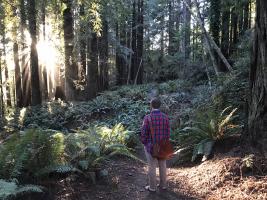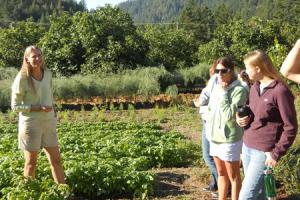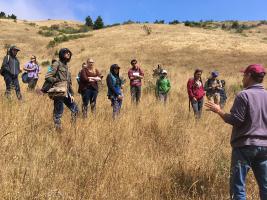How to Apply
Priority Deadline: February 1 – Applications received by this date receive first consideration for admission and funding.
Final Deadline: April 1 – All applications must be submitted by this date to be considered.
Application Reviews: Reviews begin just after the February 1 priority deadline. Additional review cycles typically occur in March and, if needed, in April.
Admission Decisions: Decisions are made in rounds following each grouped review cycle, rather than immediately after each individual submission.
Complete Applications Required: To be considered for review, all application materials must be submitted by the deadline. This includes the online application, official transcripts, and letters of recommendation.
Applying early ensures your file will be complete and ready for priority review. For the strongest chance of admission and funding, we encourage you to apply by February 1.
Admission Requirements
Completed B.A. or B.S. degree from an accredited college or university
Prior coursework in social science
Applicants whose coursework does not include social science should indicate in their statement of purpose how they plan to acquire a basic understanding of social science theory and research before beginning the program.
Coursework, training, certificate programs, written materials, advocacy, community work, and/or lived experience that foreground intersectional and/or decolonizing understandings of power/privilege and identity.
This requirement can be met by taking an additional course on power, privilege and/or Indigenous studies/decolonization in the first semester of the program.*
Please describe how you have met or will meet this requirement in your statement of purpose.
Minimum 3.0 grade point average in the last 60 units of coursework
- If you have less than a 3.0 in the last 60 units, then we recommend ensuring that one of your letters of recommendation is from a faculty or advisor and speaks to your ability to navigate graduate level work.
GRE scores are not required
*This additional course does not count toward the M.A. degree requirements.
Application Materials.
1. Completed electronic CSU graduate application form (Cal State Apply).
- See the Graduate Admissions page for more details.
- Select the Cal Poly Humboldt campus and the program "Social Science - Environment & Community."
2. Statement of Purpose (750 words maximum).
- Please note: you will be asked to submit your statement of purpose in two areas: the Supporting Information section and the Program Materials section.
- Disregard the generic prompt in the Cal State Apply form. Instead, address the following two program-specific prompts:
1) Explain the relationship between social and environmental justice as it relates to your interests. Your statement should demonstrate an ability to think through intersectional and/or anti-colonial/decolonizing lenses. Please include a discussion of the role of power, privilege, positionality, and/or identity in environment and community relations. Some of the terms used here may be new to you; this prompt seeks to understand your familiarity with, and openness to, the frameworks that are central to the E&C program. In your response, you can consider the current moment, the historical context, and/or your personal engagement with these issues.
For example, you might address one of the following questions:
Climate resiliency
Discuss the connections between climate change, inequality, social and environmental justice. In what ways has the environmental movement exacerbated social injustice? How have Black Lives Matter, Indigenous, Latinx, and other antiracist movements shaped the climate movement?
Social change/advocacy
What’s the relationship between ecological degradation and colonization? What’s the role of traditional ecological knowledge in climate resiliency and/or environmental repair? What is a framework for social change and advocacy that foregrounds decolonial environmental justice, and how do you hope to intervene in that framework?
Research Methods
How does your positionality shape how you frame environmental concerns and inform your research interest? In what ways do you envision engaging in critical and interdisciplinary research methods that are accountable to and informed by the community?
Critical ecology
What is needed for a socially-just approach to environmental science, conservation biology, and other environmentally-related scientific projects? How do "big science" and "big business" collectively shape our political ecology and epistemic injustice? What’s the relationship between ecological health and decolonization?
2) 350 words recommended. Please describe for us: What do you hope to gain from completing your Master’s degree? Are there any areas of research or particular projects you are excited about exploring further while in the program? (This would be a place to address your prior coursework or plans to acquire training in social science, your GPA, or other aspects of your application about which you’d like to provide context.)
3. Letters of Recommendation (1-3 letters).
- Select recommendations from people in a position to assess your potential as a graduate student.
- Use the electronic recommendation request process via Cal State Apply.
4. Sample of Work (10 pages).
- Send an example of your work that reflects you as a writer, thinker, and researcher. The sample can be an academic paper, article, project, film, creative activity, website, and/or other material that demonstrates your skills in research and/or project.
- The topic can be anything you think best reflects your ability to succeed in the Environment & Community program.
- Ten pages is a guideline for the submission; your paper can be a little shorter or a little longer. If your paper is longer, please submit the entire piece rather than just 10 pages extracted.
- If appropriate, a maximum 250-word description of how this work sample demonstrates or provides context for your research interests can introduce your work.
5. Official transcript from each college attended.
- See the Graduate Admissions page for more details.
International Students
There are additional requirements for international students interested in applying to the program. Information about those requirements is available through the International Programs Office.
Financial Information
Students from the Western United States:
The Environment and Community Program is a member of the Western Regional Graduate Program, which is part of the Western Interstate Commission for Higher Education (WICHE). Membership in the WRGP enables students from any of the western United States to pursue graduate study in the E&C program while paying only California in-state tuition. For more information about the WRGP, visit: http://wiche.edu/wrgp.
Financial Aid:
All applicants are strongly encouraged to complete the Free Application for Federal Student Aid (FAFSA) and file it by the deadline. Completing the FAFSA enables applicants to be considered for federal graduate work study awards, in addition to federal and state financial aid loans and grants. Information about completing the FAFSA and about financial aid in general is available from the Humboldt Financial Aid Office.
Non-Resident Fee Waivers:
There is also a limited amount of non-resident fee waiver money granted to students in this program on a competitive basis. All admitted students who are neither California residents nor residents of the western states that belong to the Western Regional Graduate Program (see above) will be considered for this fee waiver.






